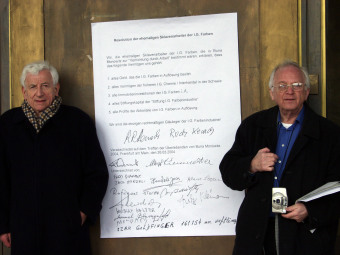Rudy Kennedy (formerly Karmeinsky, 1927–2008)

© Eva & Artur Holling
“Our fight was never about money—it was primarily a fight to keep the memory alive. Our goal was to uncover and spread the truth. The Nazis were not only the ones wearing the black uniforms of the Gestapo, but also the Germans in gray suits who sat on the boards of directors. German firms, including some without which the present-day German economy would be unimaginable, were part of the Nazis’ machinery of murder.”[1]
Rudy Kennedy was born Rudy Karmeinsky in Rosenberg near Breslau (now Wrocław, Poland) in 1927. His parents were Ewald and Adele (née Angress) Karmeinsky. Three years later, his sister, Käte, was born. The parents raised their children as Orthodox Jews. Rudy’s father wanted to study law but could not afford it, so he worked as a consultant for investors in the machine-building industry. In 1939, the family moved to Breslau. As the only Jewish child in his class at school, Rudy Kennedy was picked on and attacked by the other children. This treatment led him to transfer to the Jewish school, and after it was closed in 1941, he worked with his father as an electrician.
The family decided to emigrate, but their two attempts to obtain visas, for South America and the United States, respectively, met with failure. In 1943, with the other Jews of Breslau, they were deported to Auschwitz. Rudy’s mother and sister were selected upon arrival and gassed, while he and his father were sent to the Buna/Monowitz concentration camp. Both had to do heavy labor, digging and moving earth, at first, until they were able to find spots in the electricians’ detachment. Eight weeks later, because of his physically exhausted state, his father was selected by the SS and also sent to the gas chambers.
After two years in the concentration camp, Rudy Kennedy, along with thousands of other inmates, was taken to the Mittelbau-Dora camp when Monowitz was “evacuated” in January 1945. He survived the transport in open cattle cars because he covered himself with the corpses of fellow prisoners who had frozen to death, thus saving himself from the same fate. For Rudy Kennedy, the death march ended in April 1945 in the Bergen-Belsen concentration camp, where he was liberated by the British armed forces.
With a friend, Rudy Kennedy headed for Frankfurt am Main and went to the Salzheim DP camp, where he waited for his entry permit for Great Britain. In 1946, at last, he emigrated to London, where he changed his German-sounding surname and married his wife, Margit.
Rudy Kennedy is a founding member of the Association of Claims for Jewish Slave Labour Compensation. He advocates exposing the complicity of German industry in the Nazis’ program of “extermination through labor” and calling attention to what he views as the scandalous levels of compensation offered by the German state. In 1998, British director Luke Holland made a film about his quest for compensation of survivors of Nazi forced labor: I Was a Slave Labourer. Rudy Kennedy died on November 10, 2008, in London.
(SD; transl. KL)
















